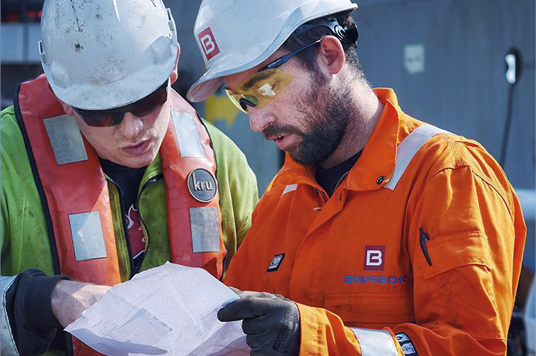Our History
From a family group to the open sea
SUGAR CANE, THE GROUP’S FIRST GROWTH DRIVER
In 1948, the Bourbon Group was created from the merger of several family companies on Reunion Island, with the aim of stimulating the local sugar industry. Its markets were chiefly sugar but also rum, which was sold in mainland France.
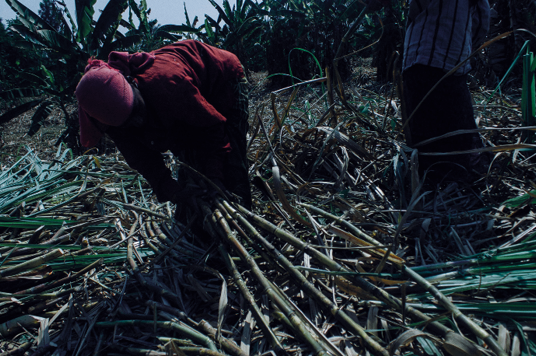
.
DIVERSIFICATION AND STOCK MARKET LISTING
After expanding geographically and diversifying into industrial fishing, retail distribution and dairy products, the Group acquired 50% of the “Compagnie Chambon” (Marseilles) in 1991 and thus took control of Surf, building on the know-how of this subsidiary to boost its growth in the offshore oil and gas marine services sector.
This strategy was reinforced in 1996 with the acquisition of another two companies: Les Abeilles (towing) and Setaf-Saget (dry bulk shipping).
In 1998, the Bourbon Group was listed on the Second Market of the Paris stock exchange.
.
REFOCUSING ON MARITIME SERVICES
The Group divested its original businesses between 2001 & 2002 and speeded up the process of refocusing on marine services by successfully positioning itself from 2003 in deep offshore marine services in Brazil and West Africa, and then in 2004 in subsea operations through the acquisition of Gaia Enterprise, which became Bourbon Offshore Gaia the following year.
In 2005, Bourbon Group became BOURBON and transferred its head office from Reunion Island to Paris.
One of the international leaders in marine services, BOURBON was listed on the SBF 120 of the Paris stock exchange in 2006.
A “PURE PLAYER” IN OFFSHORE OIL AND GAS MARINE SERVICES
BOURBON sold its port towage business in 2007 and strengthened its position in subsea operations by moving into the Inspection, Maintenance and Repair (IMR) market for offshore oil fields. In 2008, BOURBON acquired DNT Offshore, an Italian company specialising in subsea robotic operations.
The Group then divested its non-core businesses (sugar refineries, bulk transport, etc.). In 2010, in its strategic plan, “BOURBON 2015 Leadership”, it announced its ambition of becoming the world leader in offshore marine services by 2015. This plan took the form of a massive investment over three years in expanding the fleet, with the delivery of a new vessel every 11 days, something which had never been seen in the maritime industry. This gave rise to the Bourbon Liberty, Bourbon Explorer and Bourbon Evolution series of vessels.
In late 2014, the oil sector was hit by the sudden drop in the price of the barrel, triggering a profound crisis for the entire Offshore market. Until 2016, BOURBON showed resilience through operating performance, cost control measures and the conclusion of its investment plan to generate free cash flow.
.
TRANSFORMATION PLAN
In February 2018, facing the deepest crisis that the oil industry has experienced since the 1990s, BOURBON announced a strategic action plan, #BOURBONINMOTION, that would enable it to meet the need for competitiveness and to respond to customers’ new demands. This plan was based on transforming its business models and took advantage of digital technology to lower the operating costs of its vessels.
The #BOURBONINMOTION strategic action plan was based on 2 priorities:
Better serving customers through a reorganisation of the Group’s activities into three distinct subsidiaries: Bourbon Marine & Logistics, Bourbon Subsea Services and Bourbon Mobility. These three autonomous companies focus on profitable growth by developing their model towards more integrated services.
Taking advantage of the digital revolution to achieve greater differentiation by connecting the fleet. The “smart shipping” programme, which was primarily intended to improve operational excellence at optimum cost, will ensure a sustainable reduction in the operating costs of vessels.
.
TRANSFORMATION
Financial restructuring and a new shareholding structure.
The crisis in the offshore market continued and led BOURBON to sign a debt restructuring agreement with its creditor banks in mid-2017. With no positive sign of market recovery, the Group re-opened these negotiations in 2018. To protect its integrity, it requested reorganisation proceedings for its two holding companies, BOURBON Corporation and BOURBON Maritime, in July 2019.
On January 10, 2020, Société Phocéenne de Participations (SPP), owned by a group of French banks* uniting creditors representing 75% of the Group’s debt, acquired 100% of BOURBON Corporation’s assets (including the BOURBON brands) and became the Group’s new majority shareholder.
In October 2020, Bourbon sold Les Abeilles to the Econocom group, pursuing its focus on Offshore marine services around three core activities: Marine & Logistics, Mobility and Subsea Services.
BOURBON Maritime, comes out of reorganization proceedings mid December 2020 with a sharp reduction of its debt, a strengthened balance sheet and continues its transformation.
The implementation of the restructuring results in the entry of new shareholders into the capital of SPP* alongside the current shareholders who remain in the majority: ICBCL and Standard Chartered Bank with a stake of approximately 18% and 10% respectively.
.
SUGAR CANE, THE GROUP’S FIRST GROWTH DRIVER
In 1948, the Bourbon Group was created from the merger of several family companies on Reunion Island, with the aim of stimulating the local sugar industry. Its markets were chiefly sugar but also rum, which was sold in mainland France.

DIVERSIFICATION AND STOCK MARKET LISTING
After expanding geographically and diversifying into industrial fishing, retail distribution and dairy products, the Group acquired 50% of the “Compagnie Chambon” (Marseilles) in 1991 and thus took control of Surf, building on the know-how of this subsidiary to boost its growth in the offshore oil and gas marine services sector.
This strategy was reinforced in 1996 with the acquisition of another two companies: Les Abeilles (towing) and Setaf-Saget (dry bulk shipping).
In 1998, the Bourbon Group was listed on the Second Market of the Paris stock exchange.
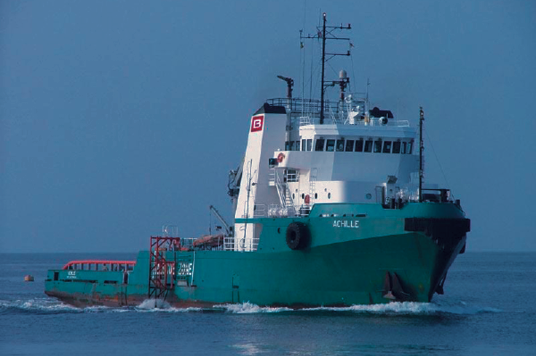
REFOCUSING ON MARITIME SERVICES
The Group divested its original businesses between 2001 & 2002 and speeded up the process of refocusing on marine services by successfully positioning itself from 2003 in deep offshore marine services in Brazil and West Africa, and then in 2004 in subsea operations through the acquisition of Gaia Enterprise, which became Bourbon Offshore Gaia the following year.
In 2005, Bourbon Group became BOURBON and transferred its head office from Reunion Island to Paris.
One of the international leaders in marine services, BOURBON was listed on the SBF 120 of the Paris stock exchange in 2006.
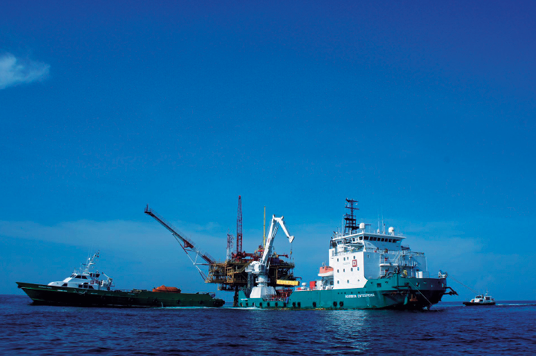
A “PURE PLAYER” IN OFFSHORE OIL AND GAS MARINE SERVICES
BOURBON sold its port towage business in 2007 and strengthened its position in subsea operations by moving into the Inspection, Maintenance and Repair (IMR) market for offshore oil fields. In 2008, BOURBON acquired DNT Offshore, an Italian company specialising in subsea robotic operations.
The Group then divested its non-core businesses (sugar refineries, bulk transport, etc.). In 2010, in its strategic plan, “BOURBON 2015 Leadership”, it announced its ambition of becoming the world leader in offshore marine services by 2015. This plan took the form of a massive investment over three years in expanding the fleet, with the delivery of a new vessel every 11 days, something which had never been seen in the maritime industry. This gave rise to the Bourbon Liberty, Bourbon Explorer and Bourbon Evolution series of vessels.
In late 2014, the oil sector was hit by the sudden drop in the price of the barrel, triggering a profound crisis for the entire Offshore market. Until 2016, BOURBON showed resilience through operating performance, cost control measures and the conclusion of its investment plan to generate free cash flow.
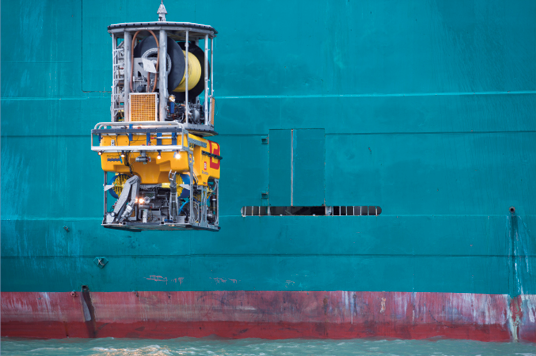
.
TRANSFORMATION PLAN
In February 2018, facing the deepest crisis that the oil industry has experienced since the 1990s, BOURBON announced a strategic action plan, #BOURBONINMOTION, that would enable it to meet the need for competitiveness and to respond to customers’ new demands. This plan was based on transforming its business models and took advantage of digital technology to lower the operating costs of its vessels.
The #BOURBONINMOTION strategic action plan was based on 2 priorities:
Better serving customers through a reorganisation of the Group’s activities into three distinct subsidiaries: Bourbon Marine & Logistics, Bourbon Subsea Services and Bourbon Mobility. These three autonomous companies focus on profitable growth by developing their model towards more integrated services.
Taking advantage of the digital revolution to achieve greater differentiation by connecting the fleet. The “smart shipping” programme, which was primarily intended to improve operational excellence at optimum cost, will ensure a sustainable reduction in the operating costs of vessels.

TRANSFORMATION
Financial restructuring and a new shareholding structure.
The crisis in the offshore market continued and led BOURBON to sign a debt restructuring agreement with its creditor banks in mid-2017. With no positive sign of market recovery, the Group re-opened these negotiations in 2018. To protect its integrity, it requested reorganisation proceedings for its two holding companies, BOURBON Corporation and BOURBON Maritime, in July 2019.
On January 10, 2020, Société Phocéenne de Participations (SPP), owned by a group of French banks* uniting creditors representing 75% of the Group’s debt, acquired 100% of BOURBON Corporation’s assets (including the BOURBON brands) and became the Group’s new majority shareholder.
In October 2020, Bourbon sold Les Abeilles to the Econocom group, pursuing its focus on Offshore marine services around three core activities: Marine & Logistics, Mobility and Subsea Services.
BOURBON Maritime, comes out of reorganization proceedings mid December 2020 with a sharp reduction of its debt, a strengthened balance sheet and continues its transformation.
The implementation of the restructuring results in the entry of new shareholders into the capital of SPP* alongside the current shareholders who remain in the majority: ICBCL and Standard Chartered Bank with a stake of approximately 18% and 10% respectively.
